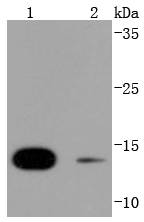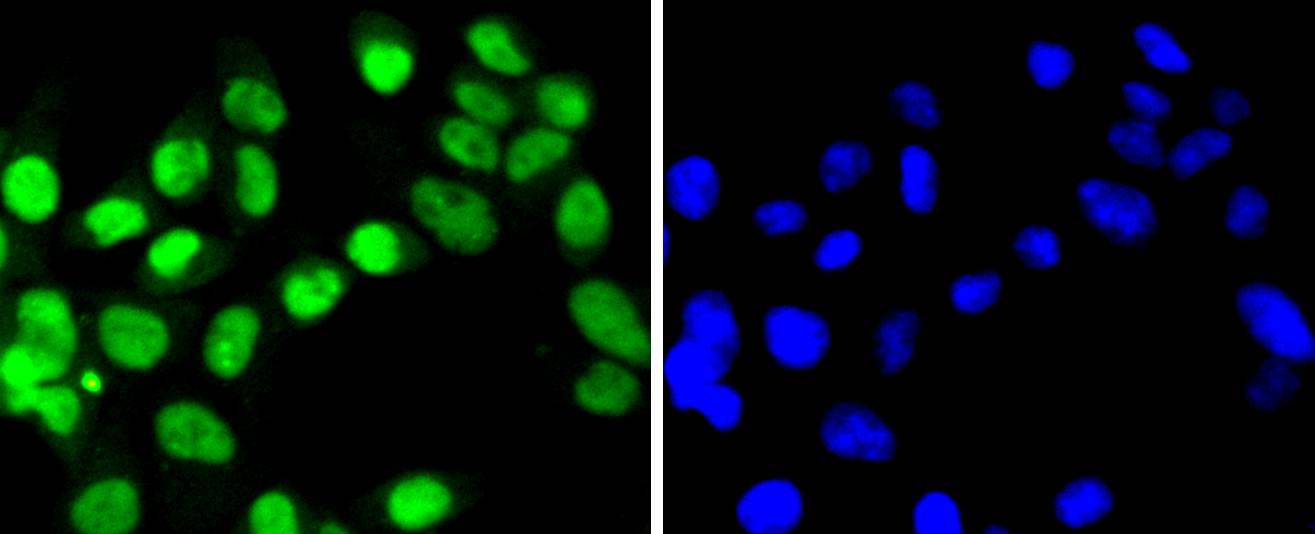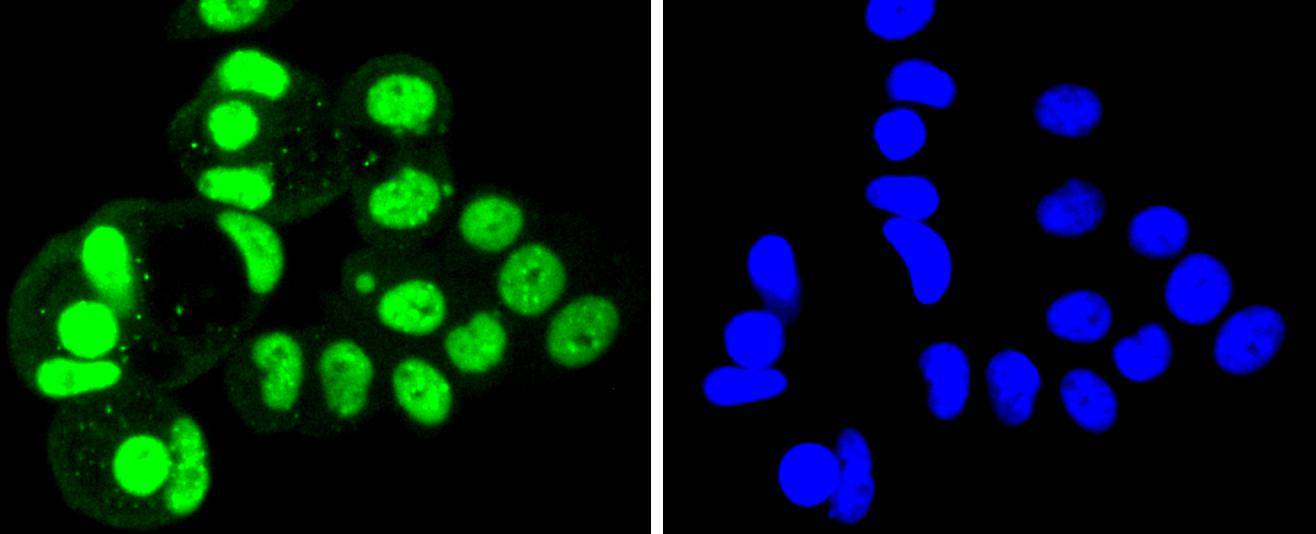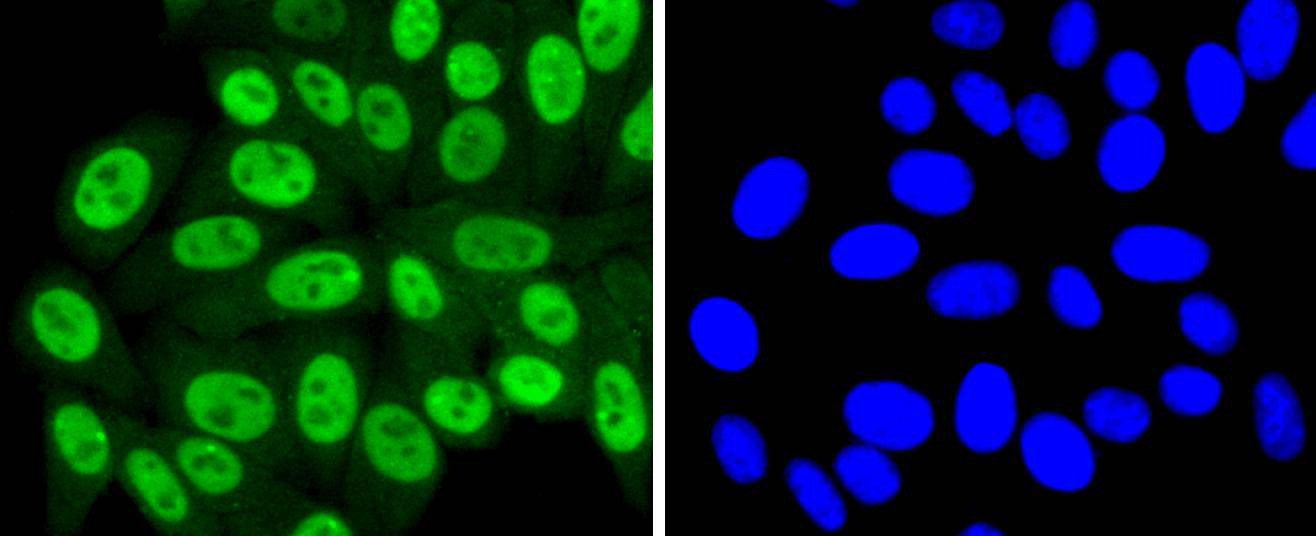Product Detail
Product NameSUMO4 Rabbit mAb
Clone No.JJ085-01
Host SpeciesRecombinant Rabbit
Clonality Monoclonal
PurificationProA affinity purified
ApplicationsWB, ICC/IF, IP, FC
Species ReactivityHu, Ms, Rt
Immunogen Descrecombinant protein
ConjugateUnconjugated
Other NamesdJ281H8.4 antibody IDDM5 antibody Small ubiquitin like modifier 4 protein antibody Small ubiquitin-like protein 4 antibody Small ubiquitin-related modifier 4 antibody SMT3 suppressor of mif two 3 homolog 2 antibody SMT3 suppressor of mif two 3 homolog 4 (S. cerevisiae) antibody SMT3H4 antibody SUMO 4 antibody SUMO-4 antibody SUMO4 antibody SUMO4_HUMAN antibody
Accession NoSwiss-Prot#:Q6EEV6
Uniprot
Q6EEV6
Gene ID
387082;
Calculated MW11 kDa
Formulation1*TBS (pH7.4), 1%BSA, 40%Glycerol. Preservative: 0.05% Sodium Azide.
StorageStore at -20˚C
Application Details
WB: 1:1,000-1:2,000
ICC: 1:100-1:500
FC: 1:50-1:100
Western blot analysis of SUMO4 on different lysates using anti-SUMO4 antibody at 1/1,000 dilution. Positive control: Lane 1: 293T Lane 2: Jurkat
ICC staining SUMO4 in 293 cells (green). The nuclear counter stain is DAPI (blue). Cells were fixed in paraformaldehyde, permeabilised with 0.25% Triton X100/PBS.
ICC staining SUMO4 in MCF-7 cells (green). The nuclear counter stain is DAPI (blue). Cells were fixed in paraformaldehyde, permeabilised with 0.25% Triton X100/PBS.
ICC staining SUMO4 in HepG2 cells (green). The nuclear counter stain is DAPI (blue). Cells were fixed in paraformaldehyde, permeabilised with 0.25% Triton X100/PBS.
ICC staining SUMO4 in RH-35 cells (green). The nuclear counter stain is DAPI (blue). Cells were fixed in paraformaldehyde, permeabilised with 0.25% Triton X100/PBS.
Flow cytometric analysis of 293 cells with SUMO4 antibody at 1/50 dilution (red) compared with an unlabelled control (cells without incubation with primary antibody; black). Alexa Fluor 488-conjugated goat anti rabbit IgG was used as the secondary antibody
The small ubiquitin-related modifier (SUMO) proteins, which include SUMO-1, SUMO-2, SUMO-3 and SUMO-4, belong to the ubiquitin-like protein family. Like ubiquitin, the SUMO proteins are synthesized as precursor proteins that undergo processing before conjugation to target proteins. Ubiquitin and SUMO proteins utilize the E1, E2 and E3 cascade enzymes for conjugation. However, SUMO and ubiquitin differ with respect to targeting. Ubiquitination predominantly targets proteins for degradation, whereas sumoylation targets proteins for a variety of cellular processing, including nuclear transport, transcriptional regulation, apoptosis and protein stability. The unconjugated SUMO-1, SUMO-2, SUMO-3 and SUMO-4 proteins localize to the nucleus. In contrast to the other SUMO proteins, SUMO-4 seems to be insensitive to sentrin-specific proteases due to the presence of Pro-90, which may impair processing to mature form and conjugation to substrates. It is suggested that defects in the gene that encodes for the SUMO-4 protein may be involved in the pathogenesis of type I diabetes.
If you have published an article using product 49293, please notify us so that we can cite your literature.








 Yes
Yes



